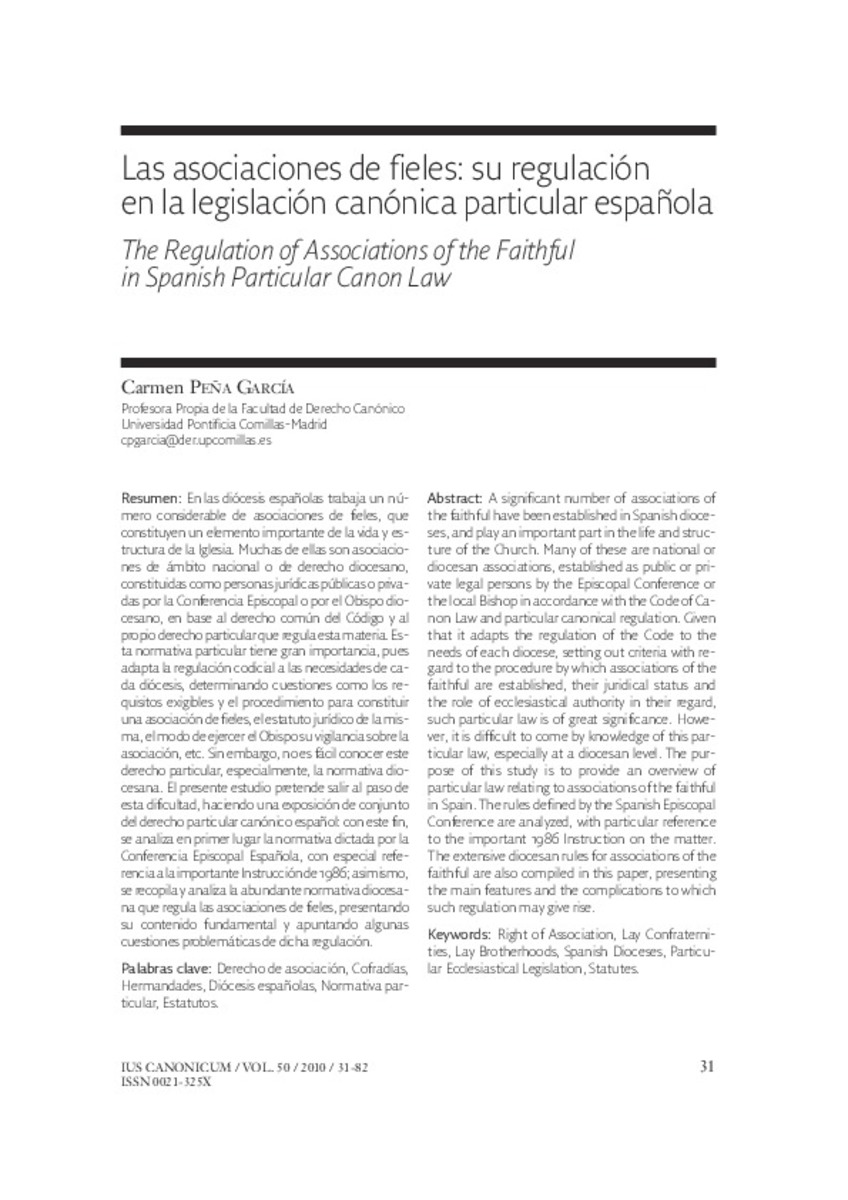Full metadata record
| DC Field | Value | Language |
|---|---|---|
| dc.creator | Peña-García, C. (Carmen) | - |
| dc.date.accessioned | 2014-08-13T06:27:29Z | - |
| dc.date.available | 2014-08-13T06:27:29Z | - |
| dc.date.issued | 2010 | - |
| dc.identifier.citation | IUS CANONICUM, 2010, 50, N. 99, págs. 31-28. | es_ES |
| dc.identifier.issn | 0021-325X | - |
| dc.identifier.uri | https://hdl.handle.net/10171/36323 | - |
| dc.description.abstract | En las diócesis españolas trabaja un número considerable de asociaciones de fieles, que constituyen un elemento importante de la vida y estructura de la Iglesia. Muchas de ellas son asociaciones de ámbito nacional o de derecho diocesano, constituidas como personas jurídicas públicas o privadas por la Conferencia Episcopal o por el Obispo diocesano, en base al derecho común del Código y al propio derecho particular que regula esta materia. Es- ta normativa particular tiene gran importancia, pues adapta la regulación codicial a las necesidades de ca- da diócesis, determinando cuestiones como los requisitos exigibles y el procedimiento para constituir una asociación de fieles, el estatuto jurídico de la misma, el modo de ejercer el Obispo su vigilancia sobre la asociación, etc. Sin embargo, no es fácil conocer este derecho particular, especialmente, la normativa diocesana. El presente estudio pretende salir al paso de esta dificultad, haciendo una exposición de conjunto del derecho particular canónico español: con este fin, se analiza en primer lugar la normativa dictada por la Conferencia Episcopal Española, con especial referencia a la importante Instrucción de 1986; asimismo, se recopila y analiza la abundante normativa diocesana que regula las asociaciones de fieles, presentando su contenido fundamental y apuntando algunas cuestiones problemáticas de dicha regulación. | es_ES |
| dc.description.abstract | A significant number of associations of the faithful have been established in Spanish dioceses, and play an important part in the life and structure of the Church. Many of these are national or diocesan associations, established as public or private legal persons by the Episcopal Conference or the local Bishop in accordance with the Code of Canon Law and particular canonical regulation. Given that it adapts the regulation of the Code to the needs of each diocese, setting out criteria with regard to the procedure by which associations of the faithful are established, their juridical status and the role of ecclesiastical authority in their regard, such particular law is of great significance. However, it is difficult to come by knowledge of this particular law, especially at a diocesan level. The purpose of this study is to provide an overview of particular law relating to associations of the faithful in Spain. The rules defined by the Spanish Episcopal Conference are analyzed, with particular reference to the important 1986 Instruction on the matter. The extensive diocesan rules for associations of the faithful are also compiled in this paper, presenting the main features and the complications to which such regulation may give rise. | es_ES |
| dc.language.iso | spa | es_ES |
| dc.publisher | Instituto Martín de Azpilcueta | es_ES |
| dc.rights | info:eu-repo/semantics/openAccess | es_ES |
| dc.subject | Derecho de asociación | es_ES |
| dc.subject | Cofradías | es_ES |
| dc.subject | Hermandades | es_ES |
| dc.subject | Diócesis españolas | es_ES |
| dc.subject | Normativa particular | es_ES |
| dc.subject | Estatutos | es_ES |
| dc.subject | Right of Association | es_ES |
| dc.subject | ay Confraternities | es_ES |
| dc.subject | Lay Brotherhoods | es_ES |
| dc.subject | Spanish Dioceses | es_ES |
| dc.subject | Particu- lar Ecclesiastical Legislation | es_ES |
| dc.subject | Statutes | es_ES |
| dc.title | Las asociaciones de fieles: su regulación en la legislación canónica particular española | es_ES |
| dc.title.alternative | The Regulation of Associations of the Faithful in Spanish Particular Canon Law | es_ES |
| dc.type | info:eu-repo/semantics/article | es_ES |
| dc.identifier.doi | 10.15581/016.50.2653 | es_ES |
Files in This Item:
Statistics and impact
Items in Dadun are protected by copyright, with all rights reserved, unless otherwise indicated.






